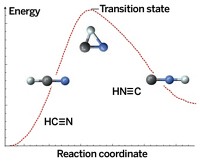Advertisement
Grab your lab coat. Let's get started
Welcome!
Welcome!
Create an account below to get 6 C&EN articles per month, receive newsletters and more - all free.
It seems this is your first time logging in online. Please enter the following information to continue.
As an ACS member you automatically get access to this site. All we need is few more details to create your reading experience.
Not you? Sign in with a different account.
Not you? Sign in with a different account.
ERROR 1
ERROR 1
ERROR 2
ERROR 2
ERROR 2
ERROR 2
ERROR 2
Password and Confirm password must match.
If you have an ACS member number, please enter it here so we can link this account to your membership. (optional)
ERROR 2
ACS values your privacy. By submitting your information, you are gaining access to C&EN and subscribing to our weekly newsletter. We use the information you provide to make your reading experience better, and we will never sell your data to third party members.
Physical Chemistry
Isotope Effects On Acidity Resolved
by Stu Borman
July 25, 2011
| A version of this story appeared in
Volume 89, Issue 30
The answer to a 50-year-old question about the origin of secondary isotope effects on acidity could lead to new insights on molecular structure and reactivity. Secondary deuterium effects on acidity stem from substituting deuterium for hydrogen at intact (nonacidic) bonds in acid molecules. The reduced acidity that results is known to be caused by deuteration-induced reductions in bond vibration frequencies and ground-state energies. Researchers have wondered whether inductive effects from reduced dipole moments in carbon-deuterium bonds, exhibited as entropy changes, also contribute to the effects, but the entropy changes couldn’t be measured. Charles L. Perrin and Agnes Flach of the University of California, San Diego, have now used an NMR titration method to show that no entropy change occurs upon acid deuteration, rejecting the possibility that inductive effects contribute to reduced acidity (Angew. Chem. Int. Ed., DOI: 10.1002/anie.201102125). The experiments “are beautifully conceived and executed and appear to be definitive,” comments Andrew Streitwieser of UC Berkeley. The study “is sure to make its way into advanced organic chemistry textbooks,” adds Daniel O’Leary of Pomona College, in Claremont, Calif.




Join the conversation
Contact the reporter
Submit a Letter to the Editor for publication
Engage with us on Twitter